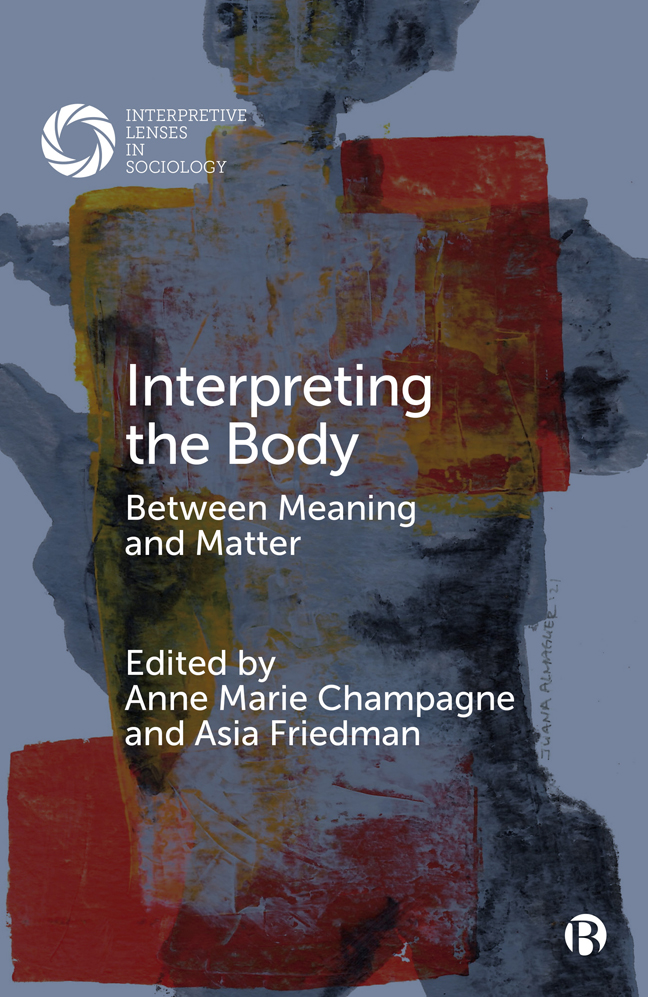Book contents
- Frontmatter
- Dedication
- Contents
- Series Editors’ Preface: Interpretive Lenses in Sociology—On the Multidimensional Foundations of Meaning in Social Life
- Notes on Contributors
- Preface and Acknowledgments
- Introduction: Between Meaning and Matter
- 1 Toward a Strong Cultural Sociology of the Body and Embodiment
- 2 Thinking the Molecular
- 3 Interpreting Africa's Seselelãme: Bodily Ways of Knowing in a Globalized World
- 4 Gender on the Post-Colony: Phenomenology, Race, and the Body in Nervous Conditions
- 5 Reinterpreting Male Bodies and Health in Crisis Times: From “Obesity” to Bigger Matters
- 6 Beauty, Breasts, and Meaning after Mastectomy
- 7 “You Are Not the Body”: (Re)Interpreting the Body in and through Integral Yoga
- 8 Black Girls’ Bodies and Belonging in the Classroom
- 9 Embodied Vulnerability and Sensemaking with Solidarity Activists
- 10 Our Bodies, Our Disciplines, Our Selves
- Index
4 - Gender on the Post-Colony: Phenomenology, Race, and the Body in Nervous Conditions
Published online by Cambridge University Press: 23 January 2024
- Frontmatter
- Dedication
- Contents
- Series Editors’ Preface: Interpretive Lenses in Sociology—On the Multidimensional Foundations of Meaning in Social Life
- Notes on Contributors
- Preface and Acknowledgments
- Introduction: Between Meaning and Matter
- 1 Toward a Strong Cultural Sociology of the Body and Embodiment
- 2 Thinking the Molecular
- 3 Interpreting Africa's Seselelãme: Bodily Ways of Knowing in a Globalized World
- 4 Gender on the Post-Colony: Phenomenology, Race, and the Body in Nervous Conditions
- 5 Reinterpreting Male Bodies and Health in Crisis Times: From “Obesity” to Bigger Matters
- 6 Beauty, Breasts, and Meaning after Mastectomy
- 7 “You Are Not the Body”: (Re)Interpreting the Body in and through Integral Yoga
- 8 Black Girls’ Bodies and Belonging in the Classroom
- 9 Embodied Vulnerability and Sensemaking with Solidarity Activists
- 10 Our Bodies, Our Disciplines, Our Selves
- Index
Summary
What is the body and what can it do? How does the lived body experience itself and what are the structural and historical vectors that mediate its emergence and disappearance? The intermittent appearance of the racialized body in and out of theory, history, and politics compels us to ask the questions that have dominated body and embodiment studies (Douglas, 1966; Elias, 1978; Turner, 1984, 2012; Featherstone et al, 1991; Butler, 1993; Shilling, 2003) in a new way. This chapter was written in a moment when Black and racialized bodies have once again gained prominence because of the brutal murder of George Floyd in the United States, suffocated under a white policeman's knee. And yet, we have been here before and found that just as suddenly as the racialized body appears in our critiques and analyses, it disappears.
Critical approaches to the body, from social constructionism (Weinberg, 2012) to feminism (Mohanty, 1991; Crenshaw, 1994) to critical race studies (Weheliye, 2014), have attempted to respond to the disappearance of the racialized body with varying levels of success. Feminism, as a unifying arc and promise of gender justice, has needed to reckon with its own racializing imaginaries, working through white feminisms’ uncomfortable relationship with Black women's class and race subordination (Olufemi, 2020). Epistemological claims advanced within white feminism and the European philosophical tradition—about gender as a category and gender equality as a social process—have failed to consider how colonial histories perpetuate unequal subject locations for people of color and, in particular, women located in the Global South. While there have been movements toward integrated analysis (intersectional theory presents one example [Crenshaw, 1994]), the basic crux of the argument has not been addressed. The bodies, stories, narratives, and embodied histories of Black, Indigenous, and other women of color have been noticeably absent in both white feminist scholarship and race scholarship.
We contend that gender is a colonial formation, insofar as the concept and constructs of gender have been derived from Western epistemologies that underpin social orders and norms typical of Western societies. Due to the mainstreaming of concepts concerning gender, patriarchy, and sexual and reproductive control, the multifarious representations through which women's identities and embodied belongings emerge—for example, within African countries—are read or interpreted through lenses of oppression and victimhood.
- Type
- Chapter
- Information
- Interpreting the BodyBetween Meaning and Matter, pp. 88 - 108Publisher: Bristol University PressPrint publication year: 2023



